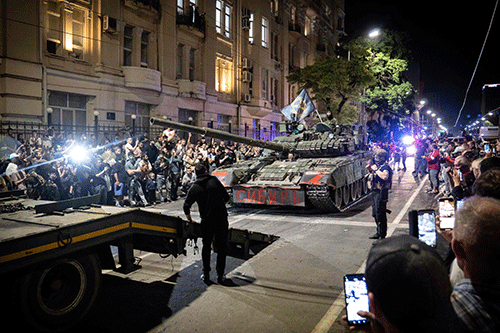MOSCOW- The head of the Wagner mercenary group, Yevgeny Prigozhin called off his armed mutiny over the weekend, defusing Russia’s biggest political crisis in decades.
However, a lot of questions remain.
Prigozhin’s whereabouts remain unknown. He was last seen late Saturday in an SUV leaving the southern city of Rostov-on-Don, where his fighters had seized a military headquarters.
The Kremlin said Prigozhin will be allowed to leave the country for Belarus, and will not be prosecuted.
But experts say it is unclear if Prigozhin will be left in peace.
Military blogger, Michael Nacke suggested that Prigozhin planned to set up a base with some of his Wagner forces in Belarus and continue his operations in Africa.
However, he said the personal guarantees of Putin and Belarus leader Alexander Lukashenko, who mediated the conflict, did not mean anything.
“Prigozhin has become an extremely vulnerable target. He can be imprisoned, he can be killed and nothing will happen,” said Nacke.
He said many members of the Wagner group were “disappointed” by the climbdown.
Prigozhin attempted a mutiny after President Vladimir Putin said members of his increasingly-powerful mercenary outfit must sign contracts with the defence ministry.
“They wanted to disband PMC (Private Military Company) Wagner,” said Prigozhin in his last audio message while announcing the plans to abord the bid to storm Moscow and topple the country’s military leadership.
The Kremlin said members of Prigozhin’s outfit who did not take part in the rebellion would still be able to sign contracts with the defence ministry, while the mutinous members of Wagner will not face criminal charges given their battlefield successes in eastern Ukraine.
“Wagner might be disbanded in its entirety, or absorbed. The Russian state had been trying to set up competing organizations and this process is likely to accelerate now,” said Michael Kofman of the Center for Naval Analyses, a US-based think-tank.
Tatiana Stanovaya, head of the political analysis firm R.Politik, said “Putin does not need Wagner or Prigozhin. He can manage with his own forces”.
The modalities of the deal between the Kremlin and Prigozhin remain unclear.
In a sign that Defence Minister Sergei Shoigu will keep his post for now, on Monday television broadcast footage of him inspecting Russian troops, in his first public appearance since the mutiny.
“Under pressure from the rebel, Putin will do nothing,” said pro- Kremlin political observer Sergei Markov.
Rob Lee of the US-based Foreign Policy Research Institute said that the insurrection made Shoigu and armed forces chief of staff Valery Gerasimov look weak.
“But it also demonstrated how important it is for Putin to have loyal figures in charge of his military and security services, particularly after an armed Russian group showed that is a potential threat to him,” said Lee.
Wagner’s march sparked a series of questions: why was his thousands-strong convoy allowed to take over a key military headquarters in southern Russia and advance on Moscow seemingly unopposed?
Analysts pointed out that a mutiny of such scale might have taken weeks to prepare. Some analysts said that Prigozhin would never launch a suicide mission alone.
Others said the mercenary chief acted out of desperation, and his “march of justice” was the only way for him to receive security guarantees as the defence ministry was about to dismantle his outfit.
The role of Vladimir Alekseyev, the first deputy head of the GRU, Russia’s military intelligence service, raised further questions. In a video address, Alekseyev said GRU had closely worked with Wagner for years as he urged them to halt their action.
Alekseyev also appeared to mock Shoigu and Gerasimov when Prigozhin told him in Rostov-on- Don that he wanted to see them. “Take them away”, Alekseyev said with a smile and a wave of the hand.
The Kremlin vowed that the mutiny would not affect Moscow’s assault on Ukraine, and some military analysts appear to agree.
“After Bakhmut, the military was far less dependent on Wagner. Folks often conflated Bakhmut for the entire Russian winter offensive, and Wagner’s role as though it was omnipresent on the front. It was quite narrow, and Wagner was not used for defence in the south,” said Kofman.
However, in the middle of Kyiv’s counter-offensive, the events could have a “demoralising” effect on Russian soldiers, Cedric Mas, a military historian, told Franceinfo. -Nampa/AFP


